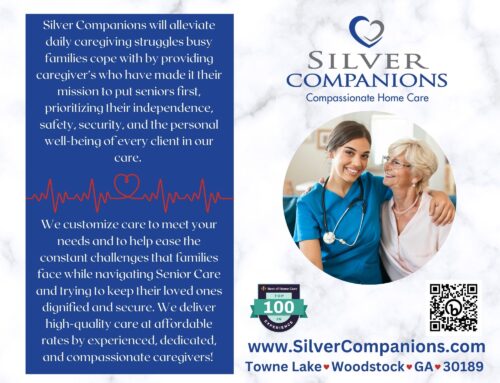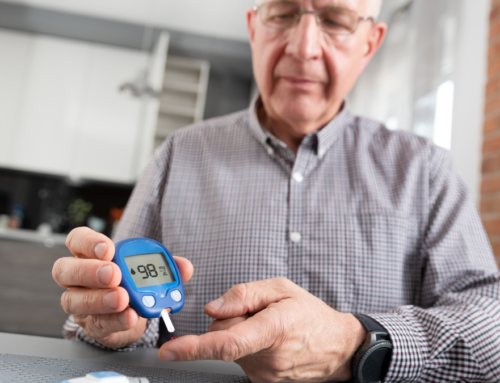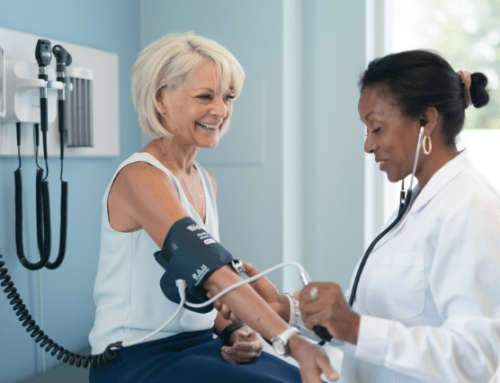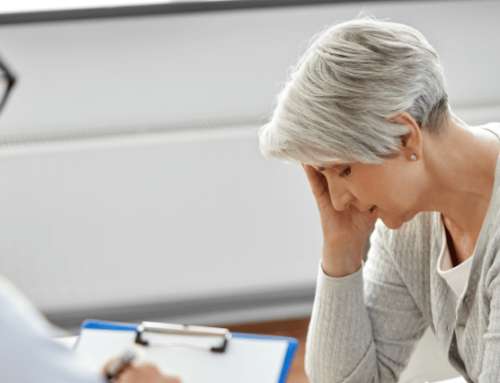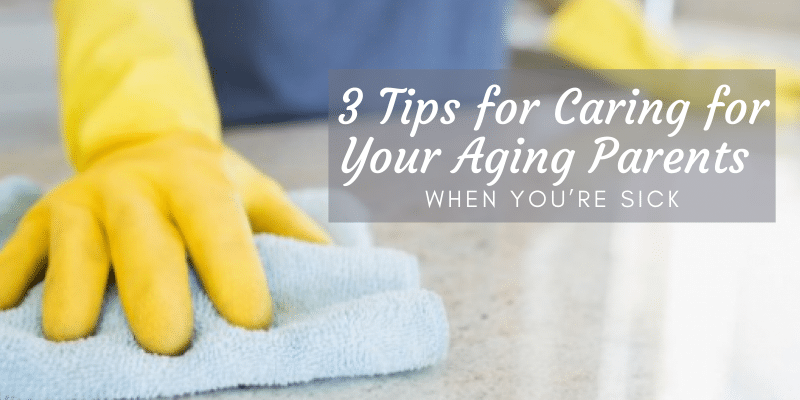
We live in a crazy time right now, beyond what most of us have ever experienced in our entire lives. Our last pandemic was in 2009, the Swine Flu, which primarily affected children and those under 65 years of age. COVID-19, on the other hand, does not discriminate based on age, and by all accounts, it hits hardest with people over 65, and those with pre-existing conditions.
That begs the question, what happens if you’re the caregiver for your aging parents, and you have the misfortune of getting sick? Whether it’s COVID-19, the flu, or even a common cold, the last thing you want to do is expose your aging parent(s) to an illness that could actually be life threatening for them.
We want to help you in this situation. Before we provide the 3 tips, it’s important that you consult your PCP (Primary Care Physician), so you know what you’re dealing with in terms of your own health. Schedule an appointment just as soon as you can, so you know what steps you need to take to get healthy again, and whether or not you need medical treatment.
Once you’ve done that, here are 3 tips for caring for your aging parents when you get sick:
- Isolate yourself, but stay home: This looks different depending whether or not you share a home with your aging parents. If you live apart from your parents, you need to stay away. If you don’t have anyone else who can help you care for them currently, see #3 for some suggestions. If you do share a home with them, you need to seclude yourself as much as possible. This includes extra doses of hand-washing, keeping your dishes separate, sleeping in a separate room, and using a separate bathroom, if possible. Try to maintain these boundaries until your health care provider deems you to have a low risk of transmission, or around 14 days. Fortunately, or maybe unfortunately, infections within a family home are usually staggered, meaning that if you do transmit the infection to your spouse/partner, it will happen after yours has receded. The one who is further along in the course of the illness (least contagious) could take on the primary caregiver role to help minimize the chance of transmission. It’s important to remember that the risk of transmission is highest in the first few days of illness, when the symptoms are more pronounced. It is not recommended that you isolate at an AirBnB or a hotel, as those risk exposing other members of the public to your illness, and current efforts are focused on social distancing and staying at home as much as possible.
- Keep all high-traffic areas clean: There are plenty of smart ways to clean and disinfect your home, but you don’t need to go nuts. If your spouse is quarantining in the bedroom, you don’t need to wear gloves and dump their contaminated dinner plate into a vat of boiling bleach. There is no need to go to extremes and use disposable dinnerware, the virus is easily cleaned by household cleaners, so you don’t have to mix your own detergents or buy anything super strong. The exception to that is the bathroom. Several studies have come out regarding the transmission of this virus through “aerosolized feces’, in addition to respiratory droplets. In other words, when the sick person is using the bathroom, they are shedding the virus in the form of gross flying poop particles. If a separate bathroom isn’t possible, all the experts suggest wiping down your bathroom daily, and especially after the sick person has used it—along with putting disinfectant in the toilet bowl, and wiping down high-touch surfaces like the faucet handles and toilet handles with disinfectant. Make sure your sick loved one closes the toilet bowl lid and washes their hands. Also be sure to wipe down all common areas. This includes the kitchen faucet, all cabinet handles, counters, chairs, living room areas, glassware the sick person touched, and any/all doorknobs in the house. Basically, any surface you/the sick person touches needs to be disinfected to minimize the spread of germs. Also, as the sick person, you should do your best to touch as few surfaces as possible.
- Backup Plan: It’s always best if you have a backup plan, so there is someone to cover if you are sick. You need to designate an alternative caregiver, or have someone you can call, to cover for you. We understand that there are circumstances that prevent you from having a regular backup caregiver, sometimes it’s a financial issue, or you don’t have anyone you can trust, or maybe your parents only trust you. The reality is, if you get sick, you need a backup plan, for you sake and your aging parents too.
If your spouse helps you care for them and you are both incapacitated at the same time, or need to be hospitalized at the same time, you need to designate a caregiver. That means, if at all possible, before you get sick, make a backup plan:- Are there ways you can care for them with limited or no physical contact?
- Do you have nearby friends or family members who can help that are not in a high-risk population.
- Post potential caregiver contact information prominently so that emergency responders can find it.
- Contact Silver Companions to discuss your situation, if we can’t help, we can likely point you in the right direction and resources. You can call us at (678) 494-8129 or email us at info@SilverCompanions.com.
It seems like this virus is proving to be much more contagious than anyone at first thought. As a result, we have to be vigilant in how we protect ourselves and any loved ones we come in contact with, to help prevent the spread of COVID-19. The same holds true for any virus, as well, we have to wear protective gear, if possible, and reduce/eliminate physical contact as much as possible if we feel we are sick, or getting sick. Even if we have no symptoms, it’s been shown that this virus can spread from people who are currently exhibiting no symptoms. That makes it tricky, because we never know when we might be carrying the disease. All we can do is practice caution, and regular protective measures, like constant hand-washing/sanitizing, and wiping down surfaces, until the threat of this virus subsidies. Even then, it’s in our best interest to continue being proactively sanitary in our everyday lives.

